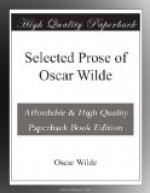WITHOUT FRONTIERS
Goethe—you will not misunderstand what I say—was a German of the Germans. He loved his country—no man more so. Its people were dear to him; and he led them. Yet, when the iron hoof of Napoleon trampled upon vineyard and cornfield, his lips were silent. ’How can one write songs of hatred without hating?’ he said to Eckermann, ’and how could I, to whom culture and barbarism are alone of importance, hate a nation which is among the most cultivated of the earth and to which I owe so great a part of my own cultivation?’ This note, sounded in the modern world by Goethe first, will become, I think, the starting point for the cosmopolitanism of the future. Criticism will annihilate race-prejudices, by insisting upon the unity of the human mind in the variety of its forms. If we are tempted to make war upon another nation, we shall remember that we are seeking to destroy an element of our own culture, and possibly its most important element. As long as war is regarded as wicked, it will always have its fascination. When it is looked upon as vulgar, it will cease to be popular. The change will of course be slow, and people will not be conscious of it. They will not say ‘We will not war against France because her prose is perfect,’ but because the prose of France is perfect, they will not hate the land. Intellectual criticism will bind Europe together in bonds far closer than those that can be forged by shopman or sentimentalist. It will give us the peace that springs from understanding.—The Critic as Artist.
THE POETRY OF ARCHAEOLOGY
Infessura tells us that in 1485 some workmen digging on the Appian Way came across an old Roman sarcophagus inscribed with the name ’Julia, daughter of Claudius.’ On opening the coffer they found within its marble womb the body of a beautiful girl of about fifteen years of age, preserved by the embalmer’s skill from corruption and the decay of time. Her eyes were half open, her hair rippled round her in crisp curling gold, and from her lips and cheek the bloom of maidenhood had not yet departed. Borne back to the Capitol, she became at once the centre of a new cult, and from all parts of the city crowded pilgrims to worship at the wonderful shrine, till the Pope, fearing lest those who had found the secret of beauty in a Pagan tomb might forget what secrets Judaea’s rough and rock-hewn sepulchre contained, had the body conveyed away by night, and in secret buried. Legend though it may be, yet the story is none the less valuable as showing us the attitude of the Renaissance towards the antique world. Archaeology to them was not a mere science for the antiquarian; it was a means by which they could touch the dry dust of antiquity into the very breath and beauty of life, and fill with the new wine of romanticism forms that else had been old and outworn.




